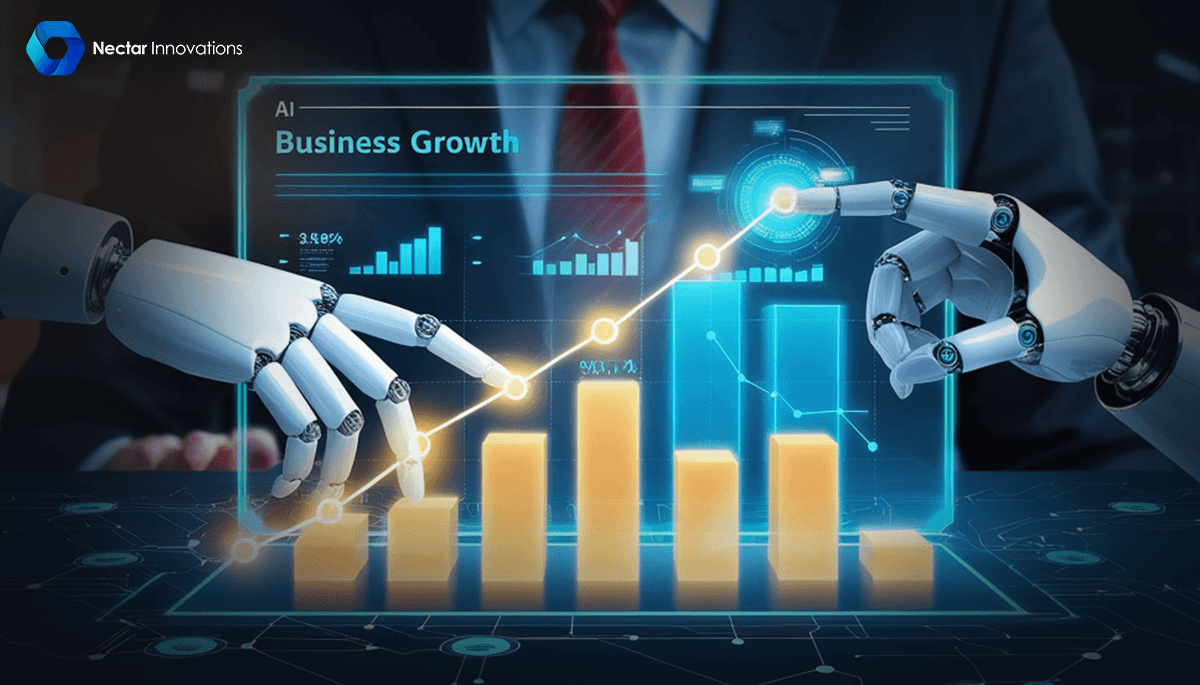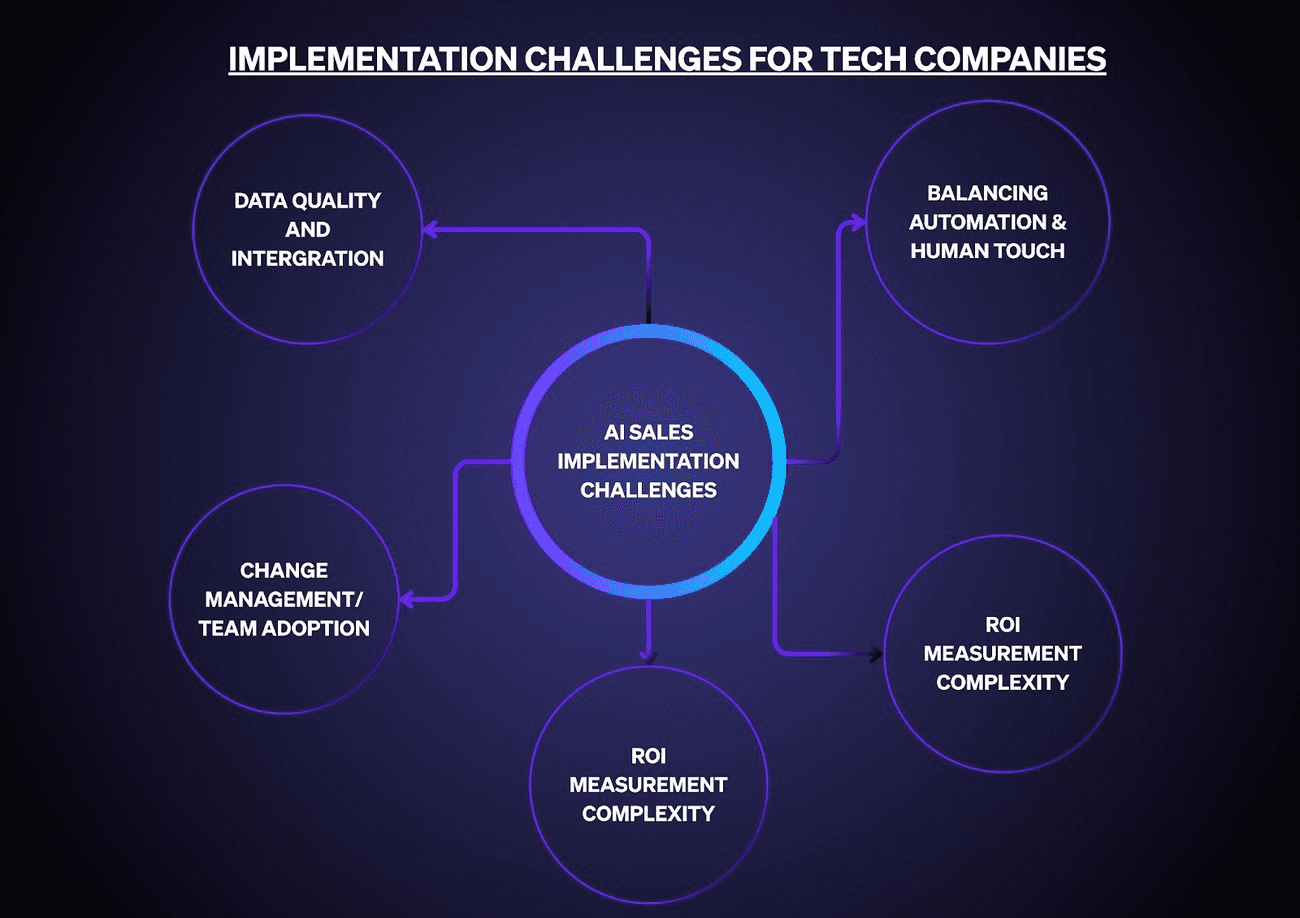AI's influence on sales goes well beyond just making things faster. The market for AI sales solutions will expand from $3.7 billion to $150 billion, showing how valuable these tools are becoming. Sales teams have embraced this technology quickly - 75% already use AI-powered tools, and 55% report better results.
These AI-powered sales tools work remarkably well for a simple reason. They can replicate your best salespeople's methods and work with your human sales team around the clock, unrestricted by location. Sales teams can now tackle their biggest challenges: low conversion rates and long sales cycles."
AI sales agents take care of time-consuming tasks that don't directly contribute to sales, which gives teams more time to focus on meaningful customer interactions. The numbers tell a clear story - teams using AI see better conversion rates throughout their sales process, with win rates jumping by more than 30%.
Core AI Agent Capabilities Boosting Sales

AI agents transform sales operations through specific capabilities that boost productivity and revenue growth. Let's get into the key functions behind these improvements.
- Automated lead qualification and scoring
AI-powered lead scoring replaces traditional manual and fixed processes that relied on human intuition. These systems analyze big datasets to identify behaviors that signal high-quality leads and rank prospects automatically. Lead qualification becomes dynamic as the system learns from new data to improve accuracy. Sales teams report that 98% believe AI improves their lead prioritization. Representatives can focus on leads that have higher conversion potential.
- Conversational AI for customer engagement
Conversational AI makes human-like customer interactions possible at scale. These systems interpret human language and recognize user intent through natural language processing and machine learning. They interact with website visitors immediately to answer questions and collect information about inbound leads.
AI chatbots ask targeted questions about budget, timeline, or product requirements to qualify leads effectively.
- Predictive lead intelligence and prioritization
Sales teams can identify high-potential leads more accurately with predictive intelligence. AI creates customized insights that support the sales process by analyzing browsing patterns, cart activity, and past purchases. This capability boosts sales productivity by approximately 3-5% of current global sales expenditures.
- Sales content personalization and recommendations
AI personalization creates immediate content tailored to individual needs by analyzing customer data and behavioral insights. The technology spots patterns and trends by examining historical and current data, especially when suggesting products based on browsing history. Want to see how Nectar Innovations can help your team build smarter with AI? Schedule a call today.
- Meeting scheduling and follow-up automation
AI scheduling assistants manage meeting logistics automatically. These tools qualify leads, book meetings through conversation, and route leads to appropriate representatives without manual work. The system captures action items, creates summaries, and arranges follow-up meetings automatically.
- Real-time coaching and guidance
AI sales coaching gives personalized training and feedback to sales professionals. The systems offer role plays, pitch practices, and knowledge reviews while providing autonomous feedback. They analyze conversations immediately for sentiment, keyword trends, and objection handling to highlight areas for improvement. This feature helps sales managers who don't deal very well with providing personalized training to every representative.
Industry-Specific AI Applications
AI sales agents provide specialized benefits that address unique industry challenges in businesses of all types.
- Retail and e-commerce: Tailored customer trips
AI revolutionizes retail through deep personalization. It creates smooth, custom interactions at every customer touchpoint. Companies that use personalization see 40% more revenue. Customers are 80% more likely to buy when brands offer tailored experiences. Major retailers like Walmart and Amazon have added AI-powered features. These include custom homepages and shopping assistant tools.
- B2B technology: Complex sales cycle management
B2B environments use AI agents in three ways: enhanced selling that improves decisions, partnered selling that provides immediate support, and independent selling that handles customer engagement. These systems track organizational patterns to predict customer needs. They deliver the right pitch at the perfect time and manage multiple stakeholders in purchasing decisions.
- Financial services: Compliance and relationship building
Financial institutions use AI to strengthen relationships while meeting strict regulations. The AI systems spot fraud by analyzing transaction patterns. Studies show that 77% of consumers support AI-based fraud prevention. Want to see how Nectar Innovations can help your team build smarter with AI? Schedule a call today.
- Healthcare: Specialized product knowledge assistance
Healthcare sales teams use AI to handle complex product information requirements. AI systems help find diseases early, speed up drug discovery, and support clinical trial recruitment. They also enable targeted treatments. Sales representatives can now provide accurate, specialized details during important sales discussions.
Overcoming Implementation Challenges

AI agents in sales show amazing potential, but organizations face some tough hurdles they need to handle well.
- Data quality and integration issues
Bad data hurts AI performance, and 81% of companies don't deal very well with their data quality problems. Sales and go-to-market information often sits scattered in different systems without proper checks. Teams should start by cleaning out old and wrong data, which can make up 80% of the total. A reliable data governance system will help AI solutions provide trustworthy insights.
- Building sales team adoption and trust
Sales teams often push back against new ways of working when they think their current quota numbers are good enough. Research shows 92% of companies ramping up AI investment need their teams to trust AI before any real change can happen. Teams need clear information about AI's benefits, since lack of proper training remains the biggest roadblock.
- Balancing AI automation with human expertise
The right mix of automation and human judgment makes AI implementation work. Companies should present AI as a tool that helps sales teams do better rather than replace them. Buyers prefer working with people they trust when stakes are high, which makes human expertise invaluable.
- Addressing privacy and ethical considerations
AI systems that handle customer data must follow rules like GDPR. AI algorithms with bias can break trust and create compliance problems, so regular checks and explainable AI tools are needed. Companies rely on AI vendors to clean personal details from training data, which creates its own risks.
- Scaling AI solutions across sales organizations
Old systems often make it hard to grow AI solutions. A capable implementation team should own the targets. Success comes from starting small with focused projects before expanding.
Conclusion
AI agents in sales operations are reshaping how companies generate revenue. Companies that make use of these intelligent solutions see major productivity gains and lower costs. AI-powered sales tools optimize traditional workflows by automating administrative tasks. They qualify leads quickly and provide real-time coaching to representatives.
These AI solutions adapt well in a variety of sectors. Retail personalization, complex B2B sales cycles, financial services compliance, and specialized healthcare knowledge assistance show the versatility of AI agents. Organizations that implement these technologies strategically gain an edge through better conversion rates and shorter sales cycles.
Success depends on solving some core challenges. Data quality is crucial. Building trust among sales teams and finding the right mix between automation and human expertise matter too. Want to see how Nectar Innovations can help your team build smarter with AI? Schedule a call today. Companies also need to handle privacy concerns and scaling issues as they grow their AI capabilities.
Teams that blend AI capabilities with human relationship-building skills will own the future of sales. While technology handles routine tasks and provides analytical insights, human representatives bring empathy, creativity, and strategic thinking to complex sales situations. This powerful partnership reshapes the scene of sales productivity. It turns a numbers game into a targeted, efficient process that works better for both companies and their customers.
Key Takeaways
AI agents are revolutionizing sales productivity by automating administrative tasks and enabling teams to focus on high-value customer interactions, with businesses reporting up to 30% increases in win rates.
- AI automates 72% of non-selling activities, freeing sales reps to spend more time with customers and focus on relationship-building rather than administrative tasks.
- Lead qualification becomes 98% more accurate with AI-powered scoring systems that continuously learn from data to identify high-conversion prospects automatically.
- Real-time coaching and personalization through AI provides instant feedback, tailored content recommendations, and conversation insights that improve sales performance.
- Industry-specific applications deliver specialized benefits, from retail personalization generating 40% more revenue to healthcare product knowledge assistance.
- Implementation success requires addressing data quality, team adoption, and privacy concerns while maintaining the right balance between AI automation and human expertise.
The key to maximizing AI's impact lies in positioning these tools as productivity enhancers that support rather than replace human sales professionals, creating a powerful partnership that transforms sales from intuition-based to intelligence-driven revenue generation.




